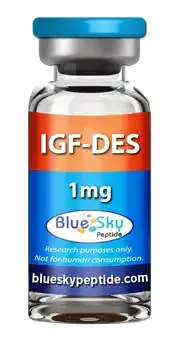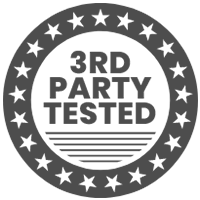45% Off Everything*
Save Now!!

Availability: In stock

| Unit Size | 1 mg/vial |
| Unit Quantity | 1 vial |
| Purity (Mass Spectrometry and UV) | 99.2% |
| pH | 7.08 |
| Bacterial Endotoxins | <2EU/mg |
| Molecular Mass | 7360.50 |
| Appearance | Lyophilized White Powder |
| Source | Recombinant Synthesis |
| Storage |
Lyophilized IGF-1 DES 1-3 is Stable at room Temperature for 90 days, however it is best to store in a freezer below - 8c for any extended period of time. After reconstitution IGF-1 DES 1-3 should be refrigerated at temperatures not to exceed 35 F. |
| Terms | The products we offer are intended for laboratory research use only. Please familiarize yourself with our terms of service prior to ordering. |
IGF-DES 1,3 (1mg) is a synthetic analog of insulin-like growth factor 1 (IGF-I) that has been the subject of extensive animal and in vitro studies in recent years. IGF-I is a peptide hormone that plays a key role in the regulation of cell growth, differentiation, and metabolism, and it has been implicated in a wide range of physiological processes, including tissue repair, bone growth, and muscle development.
The development of IGF-DES 1,3 was driven by the need to overcome some of the limitations of native IGF-I, such as its short half-life and poor tissue penetration. IGF-DES 1,3 is a truncated form of IGF-I that lacks the first three amino acids of the native sequence, and it has been shown to have a longer half-life and greater tissue penetration than native IGF-I.1
In vitro studies have provided evidence that IGF-DES 1,3 is 10 times more effective than IGF-I in stimulating hypertrophy and proliferation of cultured cells.1 In vivo studies conducted in mice have corroborated these findings, showing that administering a lower dose of IGF-DES 1,3 resulted in a significant increase in kidney and heart weights compared to control mice. In contrast, a higher dose of IGF-I was required to produce a similar effect.2
Another study conducted in rats revealed that IGF-DES 1,3 may be useful in overcoming growth impairment in renal failure. In that study, the des(1-3) variant of IGF-I was compared with native IGF-I in its growth-promoting effects in rats following partial nephrectomy. The study involved three groups of rats treated with IGF-I, IGF-DES 1,3, or vehicle. The results indicated that the food intake and nitrogen balance of the peptide-treated groups improved compared to the vehicle-treated nephrectomized group. However, IGF-DES 1,3 was found to be more effective in reducing nitrogen excretion and muscle protein degradation and decreasing serum urea levels.3
While the results of animal and in vitro studies of IGF-DES 1,3 are promising, more research is needed to fully understand its potential therapeutic uses and potential side effects. In conclusion, IGF-DES 1,3 is a synthetic analog of IGF-I that has shown promising results in animal and in vitro studies. Its longer half-life and greater tissue penetration make it a potentially valuable therapeutic agent for a variety of conditions, and ongoing clinical trials will provide more information about its safety and efficacy in humans.
References: 1. Ballard FJ, Wallace JC, Francis GL, Read LC, Tomas FM. Des(1-3)IGF-I: a truncated form of insulin-like growth factor-I. Int J Biochem Cell Biol. 1996 Oct;28(10):1085-7. 2. Gillespie C, Read LC, Bagley CJ, Ballard FJ. Enhanced potency of truncated insulin-like growth factor-I (des(1-3)IGF-I) relative to IGF-I in lit/lit mice. J Endocrinol. 1990 Dec;127(3):401-5. 3. Martin AA, Tomas FM, Ballard FJ, Read LC. Insulin-like growth factor I and its variant, des(1-3)IGF-I, improve nitrogen balance and food utilization in rats with renal failure. Miner Electrolyte Metab. 1992;18(2-5):264-8. 4.